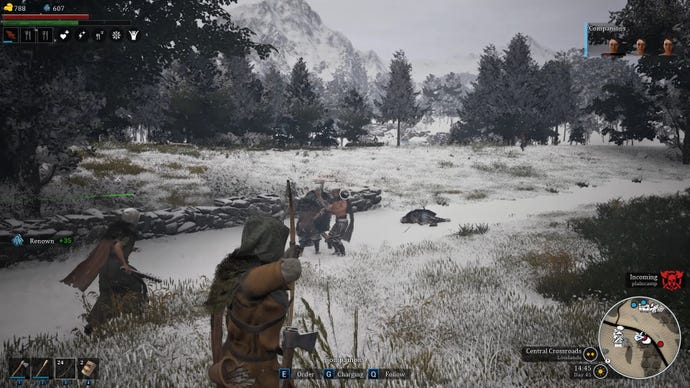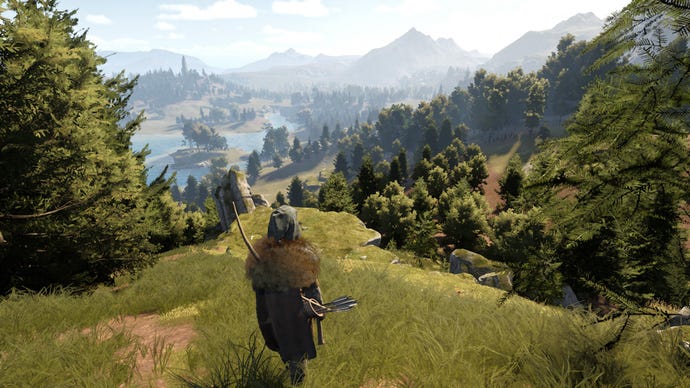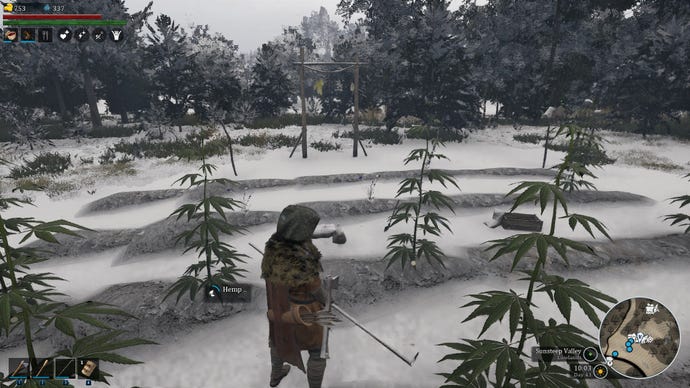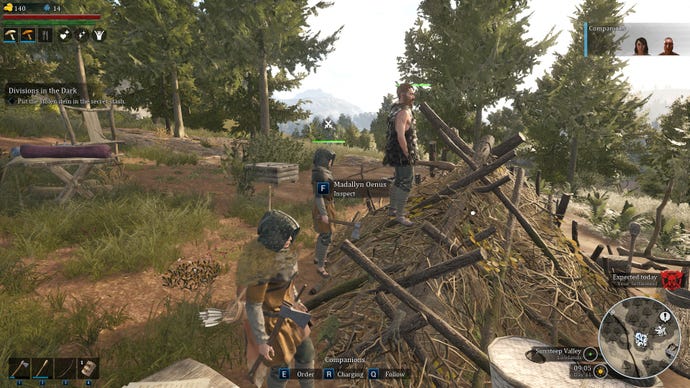Products You May Like
I should be further in than this. My supposed rebellion has thus far eked out a territory that could be described as “where?”. My personal reputation is great only among people who love mushrooms and hate deer. It’s been long enough that I should probably be a fierce warlord running a large chunk of the kingdom in opposition by now, but instead, I have the skillset of fifty peasants, and the outstanding work of fifty three. And I know why. Bellwright has taught me what I already knew in theory, but had not truly appreciated:
Good managers are rare and precious. And I’m not one of them.
Bellwright’s tricky because if I list everything that’s in it, you might get excited, but then find that although you like its parts, you don’t like the way they’re arranged. You might be very interested in one or two elements but hate the others. Or I may make it sound like it’s spreading itself too thin.
It is ostensibly about avenging some weirdly interesting, folk-tale-esque misfortune from your youth, but that becomes irrelevant almost immediately. Its store page centres on how it’s about leading an army to do sorta Mount & Blade skirmishing and stabbing, in a fully open 3D world. It’s a crafting and survival game too, which is partly why I went astray, but we’ll get there.
What I didn’t appreciate is that it’s about management above all. I don’t mean “you’ll be in menus a lot”. It’s about why management exists: not for its own sake, but to serve an end. That end could be selling goods, or maintaining and distributing student records to where they’re needed. Or providing countless people with endless entertainment, interesting critique, and thoughtful reflections of a kind most can barely even imitate let alone match. Perhaps introducing obscure and underlit games in a brutally hard industry to an audience that will enjoy life a little more for having found them; an audience whose other options are too often cynical, rote, or plain uninterested in any greater significance or purpose to the work. Or liberating the land by killing all the baddies, sure.


In Bellwright, see, your people aren’t a warband who follow you everywhere. You will get a warband, but that’s just one department. You recruit people by impressing the local villages through killing wandering bandits, building certain things, and doing little side jobs in the traditional RPG fashion. These vary but commonly involve postal work or sourcing items. Cash, skill-bumping books and renown are your rewards, and with enough of the latter (and enough separately-tracked trust with their specific village) you can personally approach villagers and poach them.
From there you can arm them as “companions”, who’ll follow you around and obey basic orders as you explore, fight, and win over more villagers until they’re knocked out (they return as wounded, and die permanently if battered again before recovering) or run out of food. You can have them patrol your land to slow the progress of the regular raids (whose frequency and intensity can be adjusted, or disabled entirely, an important feature in the game’s favour given how its hybrid nature will attract a variety of players). I failed to do enough of this companion thing for a long time, which was my first mistake. I like exploring and foraging, and having people standing around awkwardly watching me felt weird.
It seemed better to set them to non-violent pursuits. Each recruit has several combat skills, but also worker skills that are improved through use. Bellwright gives you an unfair advantage here by giving you the power to see everyone’s potential, a magic wielded in reality by very few, and suddenly, shamefully, one fewer around here. Everyone can work, fight, or switch as needed (same, etc.), and additional toggles give more wiggle room for workers to flee or resist when trouble appears, and to act as reserves, dropping their farm juice and joining your companions when you press the panic button (a system that currently needs some ironing out).

It’s the workers that are key, though. I fell into the trap of thinking of this as a survival and building game, because you start by picking berries, sticks, and stones, and smushing them into tools, then buildings. That’s the common fantasy of survival games, right? You punch one tree and from there inevitably build an empire to conquer the world and personally slay god, all with your own two hands. Chopping trees is enjoyable here, and there’s some decent hunting too. I hunted a fair bit in Medieval Dynasty (perhaps Bellwright’s closest relative) and Myth of Empires, but it was always disappointing. Here “use trees to break line of sight” is as advanced as it gets, but it’s just a little tricky, enough to make success satisfying, and you can cleanly kill a deer in one shot with the starter bow, so it feels like you’re hunting, not dicking about with numbers.
You have to search for good lands too, and there’s the other reason I got sucked into my mismanagement hole: the prettiness of Bellwright’s world, and the lovely vibe of its music. Just the occasional, lazy strings of the cowboy game (or Medieval Colon Total War), but this actually leaves you alone instead of making you play GTA every time you go for a walk.
All this led me into wandering, hunting, gathering, personally keeping my people fed. I stopped doing my own crafting weeks ago, having finally twigged that crafting leaves you stuck in a menu watching a progress bar because you’re not supposed to be doing this personally, but I failed to make the same observation with foraging and hunting. Well. I knew, intellectually. But I was enjoying myself. And I got into scraps with bandits sometimes, and I needed to explore to do quests and that anyway so it’s fine that everyone back home keeps running out of food while also having nothing to do, right?
But Bellwright isn’t a survival game, or a building, or combat game. It’s all of those things integrated into a village management game. And I was failing my village. I didn’t have permanent companions because I’d failed to provide enough excess food to keep them going, and couldn’t spare the workers. Because I’d set them up all wrong. I was frequently fiddling with things on the surface. Remotely ordering workbench items, sending deliveries from one camp to another (you can freely build multiple settlements, with buildings and individuals divided as you like), building a haphazard collection of stuff in cool places.

I was fighting fires because of my poor planning and organisation. My people were failing because I wasn’t using them right. Sure, I’d adjusted their Rimworld-like job priorities system. I’d seen a logging camp grow from an attractive little hideaway to a kind of bleak stump-ridden no-forest. But I’d placed things by whim, forgetting that people had to work there. After weeks of cursing its days for being far too short (which, admittedly, they are), I finally realised that I’d done the thing all my worst managers did: alternated between micromanaging and neglect. We all know logistics and economic management win the war, but I’d still failed to heed it. I was swayed by a world that invited exploration, and my people suffered.
On the plus side, as a manager in Bellwright your people are very pliant. They’ve no meaningful distinction beyond stats and faces, and don’t need the kind of person management that makes up the unsung bulk of the real work. They don’t have flare ups and breakdowns, and if they did I’d probably just boot them rather than be patient. They don’t, say, fuck about being late with absolutely everything and still insist on urgency because their finances are such a shambles. But still I should have been better. I would never be great, but I should have learned from the example right before me.
A better manager than me would have set these people up with what they need to begin with. She’d have been seen emailing prospective contributors with gentle critique of their pitches. She’d hear me struggling, and adjust my priorities to better suit my strengths instead of stupidly insisting authority was reason. She’d have had a bit of a go at me for not eating my vegetables EVEN THOUGH doing Unknown Pleasures meant playing lots of things I hated, ACTUALLY. She’d have helped me get the treatment that’s kind of saving my life. She would have been underappreciated in her time, as the good ones usually are, but never let that ruin everything.

I am, I think, still playing Bellwright wrong. I can’t help it. They’ve built a pretty world here, and the way exploring and gathering feed into your town building and army organising, that’s interesting stuff. There’s a real conceptual appeal to forging your little resistance movement from the ground up, personally recruiting individuals by jogging into town, carrying boar meat back to your hungry lads, and occasionally chopping down a tree since you’re passing by a camp with a pit saw.
It’s a bit wobbly in parts. Combat is a little under-responsive, and tactical maneouvering limited to rather flailing scrums. Battles take a bizarre rhythm if you skirmish, as attacking enemies alternate between sprinting towards you across a field and running away like a mugger with social anxiety. Nobody has much personality, and god I wish they hadn’t included an “AI” voice option at all. It adds nothing, and only the in-menu promise that it will be gone one day (and is optional) keeps me from a paragraph of invective about its inclusion.
But I like Bellwright a lot. With an estimated 3 years of early access ahead, this could become an incredibly absorbing game. It’s been ages since I was sucked into a big tree punching sim, and where usually those end with boring plenty or grinder’s remorse, there’s something novel here. I appreciate how it’s demonstrating why major change really only comes via strategy: even if you could do anything yourself, you’ll never do it all alone. You gotta organise some people. A good warlord or general is a good manager first, and good managers are rare and precious.
We’ve all had bad managers. My people know all too well the woe that they can bring. Now that Bellwright has shown me that I am in fact one of those bad managers, I can only console myself with the thought that they will never know the far greater woe of working under a great one, only to have them unjustly taken away.
